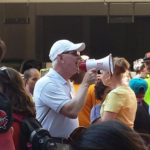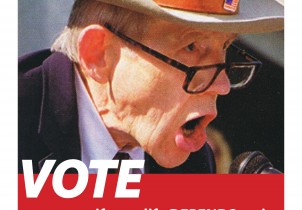Vote as if your life depends on it-
Because it does! -Justin Dart (Father of the ADA)
The Developmental Disability Seminar in Washington, D.C. this Spring had a workshop focusing on Accessibility: At the Polls and in Every Day Life. Casting a ballot in an election and going to businesses, stores, and restaurants in the community are basic civil rights. They talked about the latest threats to access in everyday life for people with disabilities – from voter accessibility to the Americans with Disabilities Act.
The ADA Education and Reform Act of 2017 (H.R. 620) adds “Notice and Cure” requirements that prevent lawsuits over architectural barriers unless an individual provides “specific enough” notice and allows 120 days for a business to correct that barrier. This is the first attempt since the 1960’s at lessening a civil rights act! One speaker shared that it is like posting a “No Colored” sign in a restaurant’s window; and saying come back in 120 days! Not acceptable!
Likewise not acceptable are the rebalancing of Medicaid, Long-Term Supports and Services (LTSS), and Home and Community Based Services (HCBS) by proposed block grants to states.
What can you do about it? Register to Vote and VOTE!
Participate in the REV UP Campaign, launched by the American Association of People with Disabilities (AAPD). It is a nonpartisan initiative that coordinates with national, state, and local disability organizations to increase the political power of the disability community while also engaging candidates and the media on disability issues. The campaign focuses on voter registration, education, access, and engagement. REV UP stands for Register! Educate! Vote! Use your Power!
The Arc of the United States recommends that you know your voting rights:
- The Voting Accessibility for the Elderly and Handicapped Act of 1984 generally requires polling places across the United States to be physically accessible to people with disabilities for federal elections. This law also requires states to make available registration and voting aids for voters with disabilities and elderly voters, including information by telecommunications devices for the deaf (TDDs).
- The National Voter Registration Act of 1993 requires that all drivers licensing entities, agencies that provide public assistance, and entities that receive state funding to provide services primarily to individuals with disabilities must help people with disabilities register to vote.
- The Help America Vote Act (HAVA) of 2002 requires at least one fully accessible voting system or machine in each precinct for people with disabilities in federal elections.
So, register, educate, vote, and use your power!

Tim Hornbecker, Advocacy Coordinator, the Arc of California

